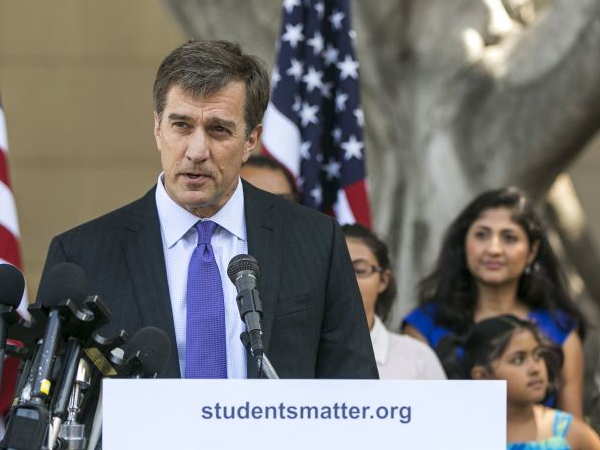Behind the conservative’s dream-come-true victory of tenure laws and union contracts for California’s public schools teachers being ruled unconstitutional Wednesday by a Los Angeles Superior Court, is an organization called Students Matter. The group is led and funded by Silicon Valley entrepreneur David Welch, who also sits on the national board of the ultra-liberal Natural Resources Defense Council.
David Welch has an incredible history of good business timing. As the Chief Technical Officer of fiber optic company Spectra Diode Labs Corporation, he made a fortune on the $41 billion merger with JDS Uniphase in 2000 just months before the “dot.com” stock bubble burst. He then co-founded Infinera in 2001 and took the company public in 2007, just before the Great Recession stock market crash. Last month, Infinera was selected as a finalist for the “Light Readin 2014 Leading Lights Award” for Best New Product (Telecom) and Company of the Year (Public) categories. Although his net worth in unknown, he holds approximately 120 patents made $4.9 million in compensation last year.
There have been increasing attacks on California teachers’ tenure and union contract protections from accountability requirements. In 2010, plaintiffs in Reed v. California used a civil rights argument to override seniority-based layoffs in three Los Angeles middle schools. The forces behind Reed and similar causes has been a long-time coalition of educational free-market supporters and privatization philanthropists, including the Gates Foundation, Los Angeles billionaire Eli Broad and Walmart’s Walton Family Foundation.
Welch was unique when he founded Students Matter as a non-profit to fund the multi-million Vergara v. California suit in 2010, according to an investigation by Capital & Main. He “had virtually no background in education policy or any direct financial stake in the multibillion-dollar, for-profit education and standardized testing industries.”
Welch grew up in a middle class family of six children. They all attended public schools through high schools and Welch went on to get a PhD from Cornell. Welch has stated that he has a “passion for public education arises from his roles both as a parent of three school-aged children and as an employer in two highly successful start-ups in Silicon Valley.”
He and his wife formed the David and Heidi Welch Foundation. The Foundation has contributed to the New Schools Venture Fund, where Welch has been an “investment partner” to underwrite both charter schools and the cyber-charter industry. The Foundation also supported Michelle Rhee’s education-privatizing lobby Students First with a $550,000 bequest in 2012. But Welch said in a newspaper commentary last year that “impact litigation” will be a more effective way than politics to bring about change.
With David Welch as a founder who has negotiated tens of billions of corporate deals in Silicon Valley, Students Matter hired Theodore B. Olson of Washington, D.C. office of the law firm of Gibson, Dunn & Crutcher as lead counsel. Ted Olson from 1981-1984 he was Assistant Attorney General in charge of the Office of Legal Counsel in the U.S. Department of Justice. From 2001-2004, he served as Solicitor General of the United States where he was the federal government’s principal advocate in front of the United States Supreme Court. He has argued 60 cases in the Supreme Court, including the two Bush v. Gore cases arising out of the 2000 presidential election, and Citizens United v. Federal Election Commission, prevailing in over 75% of those arguments. Olson was selected by Time magazine in 2010 as one of the 100 most influential people in the world.
Students First was on an early list of the Students Matter’s “advisory committee” that included Democrats for Education Reform, Parent Revolution and New Schools Venture Fund. Both Students First and New Schools Venture Fund also appear on a list of Vergara supporters that includes the California Charter Schools Association, along with Los Angeles Unified School District superintendent John Deasy and former Oakland Unified School District superintendent Tony Smith.
According to the text of Judge Rolf M. Treu’s decision for the student plaintiffs in the Vergaradecision, the lawsuit appears to have turned on the expert testimony of Professor Raj Chetty and Professor Tom Kane of Harvard. The experts applied value added measurement (VAM) to evaluate the impact of a public school teacher on the future economic well-being of students.
Judge Treu’s opinion states that Chetty established at trial that “a single year in a classroom with a grossly ineffective teacher costs students $1.4 million in lifetime earnings per classroom.” The judge also accepted Kane’s evidence that students in LAUSD taught by a teacher in the bottom 5% of competence lose 9.54 months of learning in a single year compared to students taught by an average teacher.
Working for government used to mean a trade-off–lower salaries, in exchange for higher job security. That trade-off is gone, as government workers often make very good money compared to the private sector and still have little risk of being fired. During the GSA scandal in 2011, USA Today found the federal government fired only one half of one percent of its workers in fiscal year 2011. That’s about five times smaller than the termination percentage in the private sector.
But with the Vergara v. California decision, David Welch has established that ineffective performance by a public employee can be deemed to constitutionally violate a citizens civil rights. Potentially, Vergara could have ramifications regarding job security for under-performing employees across all federal, state and local government.
Photo: Damian Dovarganes/AP

COMMENTS
Please let us know if you're having issues with commenting.